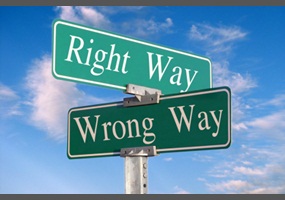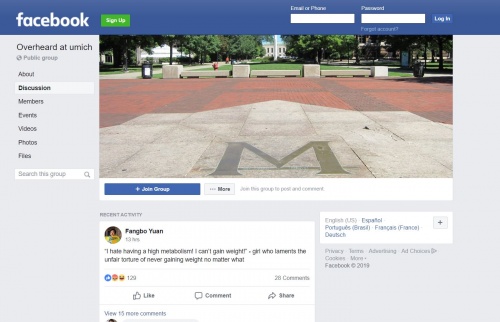Public Morality
Public morality is the observance and subscription to moral principles and ethical standards which a society enforces by statutory law, police work or social pressure in everyday public life. Activities that are regulated range from behavior of individual citizens in public spaces to the content that citizens are allowed post on social media. Typically, online based regulation includes prohibiting or restricting prostitution, pornography, and other forms of sexual vice, as well as gambling, cruelty to animals, and the use of alcohol and drugs.[1] These behaviors and actions are usually deemed immoral, sinful or degrading, contaminating the social well being of society. Public morality limits the behavior of individuals in public places to what is socially acceptable, and is often used to justify censorship. In theocracies, public morality may be equated with religious instruction, where both are given the equal force of law. These rules of public morality are woven into a group of individual's culture.

Contents
Public Morality Evolving
Views on public morality are not definite, as they are constantly changing.[3] For example, homosexuality used to be a criminal offense in most countries. Currently, there are only 10 Islamic countries ruled by Sharia law, in which acts of homosexuality may be punishable by death, but this change was gradual.[4] Only at the beginning of the 21st century did countries begin to legalize same-sex marriage. Similarly, many societies also slowly grew to accept pornography. Prior to the Golden Age of Porn,[5] participation in the creation, distribution, and consumption of pornography was illegal in most of the United States. Today the porn industry in the U.S. is worth between $10-$12 billion.
Public morality standards vary across cultures and countries. For example, the consumption of alcohol in public is banned in much of the United States, while remaining legal in countries such as Portugal, Spain, Germany, the United Kingdom, New Zealand, Japan and China. Similarly, the recreational use of marijuana has been legalized in Canada and certain states in the United States, while it still remains illegal in the many other parts of the world. Over time these standards become generally accepted public practices and contribute to defining these cultures.
Public Morality in the Digital Age
Public morality also applies to the cyberspace. There have been many cases where the online community has charged perpetrators of immoral acts. In 2009, a fourteen year old named Kenny Glenn posted two videos of him and his brother abusing a cat named Dusty. The online community -spearheaded by Anonymous- responded by tracking down the creator of the videos and passed his details to the local police department. This resulted in an arrest and the cat being taken to a safer environment.[6]
Reddit, the online community responsible for outing Kenny Glenn for his behavior, plays a major role in this online space for public morality. Reddit has thousands of subreddits dedicated to outing certain behavior that goes against established norms. Reddit outed major names in online outbreaks like Gamergate, and even deals with smaller issues within subreddits in the realm of cheating boyfriends and girlfriends. Reddit, and social media in a sense, is the online hub that people can use to call outrage to people and instances that go against public morality.
Sociologists and psychologists have begun to study the social norms of online communities such as Reddit, to better understand how such norms are created and change over time.[7] Moreover the practices online can often vary greatly from the traditional norms established in real life interactions in terms of both content as well as consequences.
Given the prominence of social media in society, public morality offenses have become much easier to discover as individuals shift their personal and private lives into online public spheres. This has raised some ethical issues concerning privacy.
Ethical Concerns
Social Media
Before the ubiquity of the internet, the separation between private and public morality was much more apparent. The overlap between private morality and public behavior was much smaller as the means to collect and dispel information was lacking at the time.[8] But, one's conduct outside of the home, be it a student, celebrity or manager of a corporation, is evaluated through the lens of public morality. Some argue however that the interleaving of these previously separate aspects of social norms, was not born with the internet but instead began as early as the advent of the printing press. From Historians recording social and cultural norms to writers and artists documenting and analyzing individual's lives, the boundary between private and public moralities and thought began to erode. Today, with the convergence of private and public lives due to social media, one's actions in private are judged using standards established by public morality, which leads to punishments in virtual environments. Facebook recently admitted to reading private chats between users for security reasons, as well company policy violations. Such constant surveillance both consciously and subconsciously effect people's behavior even in private interactions. [9]
Examples
What individuals say to each other in private conversation might get published on social media by someone overhearing the conversation.[10] An example of this is the "Overheard at Umich" Facebook group[11] where students at the University of Michigan post conversations that they overheard around campus. Some of the more controversial conversations are criticized by group members and can be traced back to the student who said those words. Any student can get into trouble if they are not careful with their words and actions due to the blurring of private and public morality caused by social media. This example raises the issue of whether it is publicly moral to say offensive things in public, but also whether it is moral for eavesdroppers to post what they hear online, especially if it can be traced and cause issues for the people who were talking. It is clear that the ethical boundaries of the individual and group is a gray area of sorts.
A more culturally specific example of public morality and social media can be seen in the rise in popularity of the Asian-centric Facebook groups “Subtle Asian Traits” and “Subtle Asian Dating”.[12] The majority of the members of these groups are Asian. However, although the majority of the members are Asian, they come from all over the world. The bulk of the members are Asians based in the United States, Australia and the United Kingdom, but there are also a large number of members from Singapore and other parts of Asia. Due to these geographical differences, different members often have varying reactions to the content posted in these groups. Some members, particularly those that are based in Asia, can be more conservative than their United States or Australia-based peers. This shows that cultural differences can influence public morality even in groups where members predominantly have the same ethnicity.
Privacy
In societies where public morality is extremely prevalent, one's private life and views automatically become public. For example, if one is watching pornography in their own home, but the law enforcers find out because they are tracking their history, they are subject to punishment. Maintaining a balance between public morality and privacy is extremely challenging. An instance of this, is a same-sex couple who meets abroad and wishes to return to the United States where only one of the partner's is a citizen.
Privacy is also becoming more difficult to contain and keep intact due to technological advances and the skill of people on the internet. Violating or revealing someone's private information is seen as very immoral, but due to the effect of technology and how reliant people are on the internet to store their data, hackers may leak their personal data or use it for themselves. Regardless of how immoral this is, online hackers are able to hide behind their screen and harass people often without ever being uncovered, which puts a new spin on public morality, as they almost never have to deal with the consequences of their actions.
Religion and Freedom
A common reason for Public morality is religion. Philosophers such as John Rawls and Jürgen Habermas have tried to argue that public morality should remain neutral and not deal with religion and other controversial issues, but the two concepts are inseparable as civil law is derived from natural law.[13] While they are intertwined, public morality has different relations with religious freedom for each country's own purposes.
In the United States, religion is used to enforce public morality practices. Washington said that morality and religion complement each other[14][15] He intended for America to be a "Christian nation", and believed that religion provides reasons for convincing citizens that liberal principles are correct. [15]
In some other countries, public morality is promoted in order to ensure religious conformity. Certain Islamic countries such as Iran, Saudi Arabia and Malaysia have religious police[16] who enforce religious standards in public. Common examples of religious standards include not abiding by Islamic dress codes, consumption of alcohol and pork, and homosexual behavior. If any of these acts are seen by said police the citizens may be arrested. In Tunisia, People who choose not to behave in accordance with the dominant religion and cultural standards of the country run the risk of being prosecuted for the crime of "defaming public morality" and being put in prison for up to six months. [17]
Other countries are moving in the opposite direction, making significant efforts to separate church from state. In Quebec, Canada, there has been significant debate over the introduction of a controversial "Bill 21." Among other things, "Bill 21 formally bans teachers, police officers, judges and many others from wearing items like hijabs, turbans, kippas, and crucifixes in the course of their duties. It also doubles down on pre-existing legislation that requires citizens to uncover their faces when accessing public services like municipal transit and the legal system."[18] This takes Quebec into unprecedented territory, not only moving strongly away from religion as a means of determining public morality but also bringing into question the morality of such restrictive legislation.
Anonymity
Public Morality has long been a holistic method of holding people accountable to a far extent in society, but the rise of anonymity in social media has challenged that notion. Phillip Pettit and Geoffrey Brennan highlight this caveat in their description of how esteems and reputations form in the public sphere. "In what we take to be the 'normal case', esteem and disteem, and reputation good or bad, will accrue in a process in which the individual's identity is clear and unproblematic. But the Internet is... not a 'normal case' in this sense... many people choose to operate on the Internet under an alias and have 'virtual' identities which are distinct from their 'real' identities." [19] The ability to hide behind an alias or operate completely anonymously has given way to some of the most prominent social media and public forum platforms such as reddit and 4chan, in which users can share unpopular, offensive, or unusual ideas without the fear of judgement or their ideas affecting their reputation.
Doxxing
The birth of the digital age and, more recently, the rise of social media, has generated more gray areas in the form of the 'public court of law.' Just as social media enables positive or humorous content to go viral in a matter of minutes, hurtful, controversial, or offensive content can do the same. As a result, when content angers a large audience it often leads to the content creator (if identifiable) to face harsh public criticism and punishment. The practice of doxxing involves exposing someone's (typically an online entity) personal information such as full name, home address, place of work or education, and sometimes their other past offenses[20]. This is done in hopes that within the large, angered audience, some people will harass the poster's employer, school, or family to 'serve justice' for what the user posted or did.
The practice of doxxing is very controversial, as most of the content that leads to doxxing is legally protected or doesn't have any legal regulation yet, despite its offensive or hurtful content. This is what leads other online users to take the initiative of making the original poster pay for their actions, and it begs the question of where lines are drawn in such reprimanding. Ethics expert Marcus Johansson argues that "there could be cases where it might be morally justified, and even morally obligatory, to punish an avatar... [because] the punishing of an avatar might be justified by a principle of appropriateness."[21]
On the other hand, there are countless cases in which the 'public court of law' has carried out extensive doxxing, only to take things too far or even target the wrong person. One case of this occurred in the aftermath of the Boston Marathon Bombings in 2013, in which the reddit community worked tirelessly to piece together the mystery of who was responsible for the attack. Within 48 hours the community identified their alleged perpetrator, a man who had been missing since prior to the bombing. Unable to locate the missing person, the anonymous users went on to relentlessly harass the alleged perpetrator's family. It turned out that reddit's alleged perpetrator had committed suicide and thus was missing, and police were forced to hinder their investigation and release the identities of their suspects so reddit users would stop harassing the innocent family, already grieving over a lost son[22]. This, in turn, led to reddit's policy against releasing personal information to disable the community from future doxxing instances.
See Also
References
- ↑ George, Robert P. "public morality." The Oxford Companion to Philosophy. : Oxford University Press, January 01, 2005. Oxford Reference, oxfordreference.com.proxy.lib.umich.edu/view/10.1093/acref/9780199264797.001.0001/acref-9780199264797-e-2086>.
- ↑ “Should Government Regulate Public Morals?” Debate.org, www.debate.org/opinions/should-government-regulate-public-morals.
- ↑ Anglim, Christopher, et al. Privacy Rights in the Digital Age, Grey House Publishing, 2016. ProQuest Ebook Central, ebookcentral-proquest-com.proxy.lib.umich.edu/lib/umichigan/detail.action?docID=4454671.
- ↑ The Washington Post, "10 Countries that punish Homosexuality by death", https://www.washingtonpost.com/news/worldviews/wp/2016/06/13/here-are-the-10-countries-where-homosexuality-may-be-punished-by-death-2/?utm_term=.b994046f1db7
- ↑ Paasonen, Susanna; Saarenmaa, Laura (July 19, 2007). The Golden Age of Porn: Nostalgia and History in Cinema (PDF). WordPress. Retrieved April 30, 2017.
- ↑ “Kenny Glenn Case / Dusty the Cat.” Know Your Meme, 17 July 2018, knowyourmeme.com/memes/events/kenny-glenn-case-dusty-the-cat.
- ↑ Eshwar Chandrasekharan, Mattia Samory, Shagun Jhaver, Hunter Charvat, Amy Bruckman, Cliff Lampe, Jacob Eisenstein, and Eric Gilbert. 2018. The Internet’s Hidden Rules: An Empirical Study of Reddit Norm Violations at Micro, Meso, and Macro Scales. Proc. ACM Hum.-Comput. Interact. 2, CSCW, Article 32 (November 2018), 25 pages. https://doi.org/10.1145/3274301
- ↑ Smith, Jeffery. "Morality, Public and Private." The SAGE Encyclopedia of Business Ethics and Society. Ed. Robert W. Kolb. Thousand Oaks,: SAGE Publications, Inc., 2018. 2383-2384. SAGE Knowledge. Web. 15 Mar. 2019, doi: 10.4135/9781483381503.n807.
- ↑ CNN, "Yes, Facebook is scanning your messages for abuse", Alanna Petroff, https://money.cnn.com/2018/04/05/technology/facebook-messenger-messages-privacy/index.html
- ↑ Daulerio, A. J. (October 1, 2010). "A Glimpse Into How The Duke Fuck List Went Viral". Deadspin. Archived from the original on 4 October 2010. Retrieved 11 October 2010.
- ↑ “Overheard at Umich.” Overheard at Umich Public Group, www.facebook.com/groups/1643645399032633/.
- ↑ Kwai, Isabella. “How 'Subtle Asian Traits' Became a Global Hit.” The New York Times, The New York Times, 11 Dec. 2018, www.nytimes.com/2018/12/11/world/australia/subtle-asian-traits-facebook-group.html.
- ↑ Blasi, Fulvio Di. "Public Morality." New Catholic Encyclopedia Supplement 2012-2013: Ethics and Philosophy, edited by Robert L. Fastiggi, vol. 3, Gale, 2013, pp. 1280-1282. Gale Virtual Reference Library, link.galegroup.com/apps/doc/CX2762500603/GVRL?u=umuser&sid=GVRL&xid=b99c4392.
- ↑ "Avalon Project - Washington's Farewell Address 1796". Avalon.Law.Yale.Edu, 2019, avalon.law.yale.edu/18th_century/washing.asp.
- ↑ 15.0 15.1 Galston, William A. “Public Morality and Religion in the Liberal State.” PS, vol. 19, no. 4, 1986, pp. 807–824. JSTOR, www.jstor.org/stable/419315.
- ↑ “Hoboken, New Jersey: John Wiley & Sons.” The Koran for Dummies, by Sohaib Sultan, Hungry Minds, 2004, pp. 238–246.
- ↑ Timep. “TIMEP Brief: Personal Freedoms and Public Morality in Tunisia.” TIMEP, 13 June 2018, timep.org/reports-briefings/timep-brief-personal-freedoms-and-public-morality-in-tunisia/.
- ↑ Uprichard, Lucy. "What Is Quebec’s Secularism Bill—And How Does It Affect Women?" Chatelaine. 3 April, 2019. https://www.chatelaine.com/news/quebec-secularism-bill-21-women/
- ↑ Brennan & Pettit. "Esteem, Identifiability, and the Internet." pp. 177
- ↑ Cooper, Stephen. "What is Doxxing." comparitech. 28 March 2019. https://www.comparitech.com/blog/vpn-privacy/what-is-doxxing-how-to-avoid/
- ↑ Johansson, Marcus. "Why unreal punishments in response to unreal crimes might actually be a really good thing." Ethics and Information Technology. 12 February 2009.
- ↑ u/badbandit56. "How did Reddit help with catching the Boston Bombers?" https://www.reddit.com/r/OutOfTheLoop/comments/97epzf/how_did_reddit_help_with_catching_the_boston/

